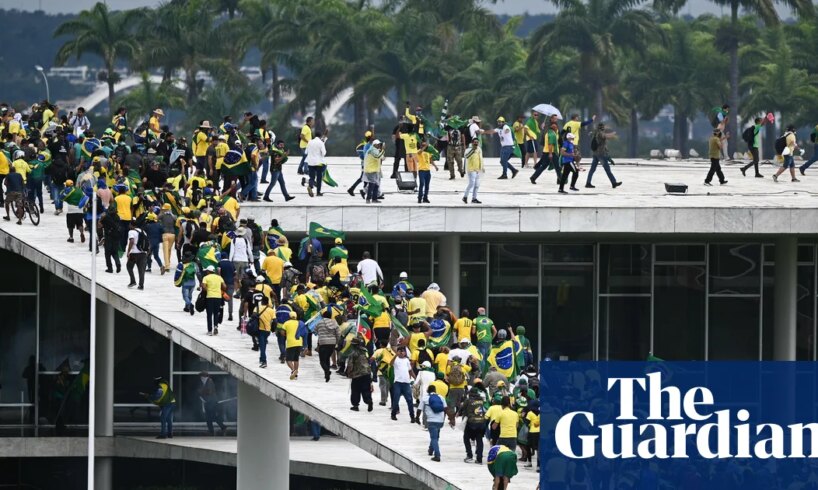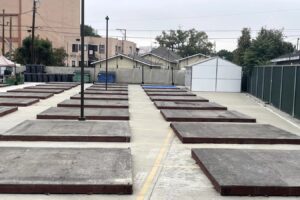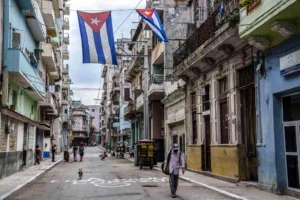
Hours after supporters of the former president Jair Bolsonaro ransacked Brasília on 8 January 2023, three electricity pylons were brought down in different locations, between 1,000 miles and 1,800 miles away from Brazil’s capital.
In the following days, 21 more towers were toppled, all using the same method: bolts were removed from the base, and supporting steel cables were cut. The perpetrators knew exactly which power lines to sever to cause the most harm to the electricity supply.
Protesters hold a banner calling on the military to intervene and overthrow Luiz Inácio Lula da Silva on 8 January 2023. Photograph: Eraldo Peres/AP
The elaborate modus operandi led the federal police to suspect that the attacks had been carried out by members of the Brazilian army’s elite unit, known as the “black cap boys”, trained in sabotage operations such as attacks on infrastructure facilities.
Two years and eight months on, the perpetrators have still not been identified.
Bolsonaro was last month found guilty of attempting to overthrow democracy, along with seven of his closest allies, including five senior military officers. In a country that has seen more than a dozen coup attempts since it became a republic, the trial marked the first time in Brazil’s history that the ringleaders of such a plot were tried and convicted.
The verdict prompted an outburst of relief and celebration among defenders of democracy, but there is a growing sense among researchers – and even some former officers – that the armed forces have not been held accountable as institutions – and that the same mentality and training that drew the military into previous conspiracies remain unchanged.
“The risk of a new coup remains very much alive,” said Rubens Pierrotti Jr, a retired colonel who served 32 years in the army and is now a lawyer and writer.
Twenty-five alleged conspirators – including 18 military personnel, five of them black cap boys – still face trial in the supreme court in the coming months.
But not all the military officers who took part in the coup attempt have been identified, let alone charged.
At least five black cap boys involved in a plan to kidnap or assassinate President Luiz Inácio Lula da Silva, his vice-president and a supreme court justice, have still not been named.
And while more than 1,000 people have been prosecuted for the 8 January riot, estimates suggest that many more took part. Experts also noted the use of special forces tactics by some rioters, such as wearing leather gloves to handle heated gas canisters.
That night, two army generals blocked police from detaining demonstrators who had camped for days outside a barracks. Police were only authorised to carry out arrests the following morning, giving many the chance to flee. The riot’s financiers – alleged to have paid for rioters’ travel to Brasília and their food while they camped outside army barracks – also remain unidentified.
Lucas Pedretti, who specialises in the study of Brazil’s brutal two-decade military dictatorship, said there had been a concerted effort by the armed forces to pin the blame on individuals, and absolve the military as an institution.
“Bolsonaro, a former army captain, and the other military officers convicted so far are not outliers … They are the prodigal sons of an institution that produces individuals shaped by an authoritarian and violent mindset,” he said.
Investigators believe the coup plot was only abandoned because the heads of the army and the air force refused to join, leaving the navy chief as Bolsonaro’s sole ally within the armed forces. Yet the two commanders did not report the coup plan to other authorities.
The document from the National Electric Energy Agency (Aneel) reported the attacks on Brazil’s power transmission lines in January 2023. Photograph: ANEEL/Sportlight
Pierrotti said the “serpent’s egg” lay in the military academies: “That is where coup-plotters are being bred”.
In the military academies, soldiers and officers are taught that the 1964 overthrow of a democratically elected president was not a coup but a “revolution” aimed at saving the country from communism. “There is indoctrination in the military schools … which ends up producing people with a far-right mindset and a mission to fight the ghost of communism,” Pierotti said.
The historian Francisco Carlos Teixeira, one of Brazil’s most renowned scholars of civil-military relations, taught for years at the army’s main officers’ college, where he said the mentality had remained unchanged for decades: “They still believe that the military should have the final say on what is suitable for the Republic,” he said.
Thiago André, who served as a navy sergeant for 14 years, said that from the moment he joined up he was told that “a coup to put Brazil back under military control would be better for the country, because the military is better than civilians at everything – including running society.
“This coup mentality, and the idea that a coup is the best solution for putting Brazil back on track, is very popular inside, and I don’t think it will end with the convictions [of Bolsonaro and his allies],” said André, who left the force in 2022 to run a podcast on Black history.
Neither the defence ministry, the army, the navy nor the air force responded to a request for comment.
Teixeira said that unless there was structural reform of training and the very makeup of the forces – for example, the complete dissolution of the black cap boys battalion – any government would remain “hostage” to the military.
“Another coup attempt could happen again, in a more sophisticated and more brutal way, because the coup mentality remains untouched,” he said. “So, this celebration – this idea of rejoicing that the coup risk has ended because of one trial – is unrealistic because the structures that generate coups remain intact.”





